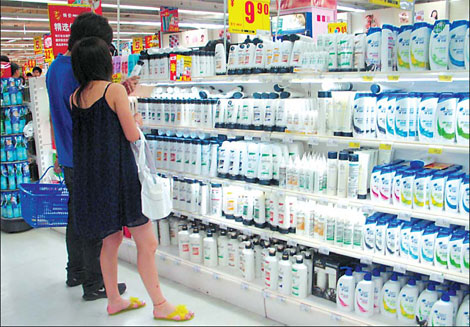|

|
|
Customers select haircare products at a supermarket in Beijing.[China Daily]
|
Consumers could turn their backs on US manufacturer Procter and Gamble (P&G) and British firm Unilever after they raised prices in July on consumer goods by up to 20 percent in China to offset surging raw materials costs.
That's according to a recent Sina.com suvey. More than 84 percent of 3,042 respondents surveyed by the website said the price hike was "unreasonable", while 87 percent threatened to switch to cheaper brands.
"Committed users are normally more tolerant to short-term changes in variables such as pricing. However, if the international brands remain unfavorably priced compared to local brands in the long term, consumers are likely to re-evaluate and may shift," Ashok Sethi, regional director of TNS, a UK-based market research and business information services provider, said.
"Even if the loss of current customers is limited, the increased price may slow further acquisitions by the brands," Sethi added.
Xu Ailu is loyal to several P&G haircare brands, but her commitment is waning after the recent price hike.
"I rushed to the nearest supermarket to buy up Pantene shampoos when I heard P&G would raise prices," the 29-year-old, who works for a fashion design company in Shanghai, said.
"Prices are still affordable, but if they rise beyond 30 percent, which is my upper limit, I will definitely shift to other brands that are more reasonably priced," she said.
Li Hui, a 27-year-old college teacher, said if P&G prices go up again she will also consider turning to local brands.
Analysts said Chinese consumers would also shift toward local brands out of national allegiance, particularly after the success of the Beijing Olympics.
Shoppers who prefer local brands far outnumber those who choose foreign products for most consumer goods, according to a recent survey by the Boston Consulting Group (BCG).
Over half the Sina.com respondents said they were more likely to buy Chinese brands if their prices remain stable.
But many local manufacturers, more vulnerable to higher costs than companies like P&G and Unilever, have already raised product prices.
"Companies like WhiteCat and Qiqiang, under the Nafine Chemical Industry Group, have raised prices by up to 10 percent as far back as March," Feng Jialu, a consumer products analyst from TX Investment and Consulting Co Ltd, said.
Feng added that local brands are less effective at cost control than their foreign counterparts.
The good news is that few domestic consumer product manufacturers have indicated they will increase prices any further.
Guangdong-based Lafang said it will not increase prices as it "has no need to do so", spokesman Cui Hongxi said, adding that P&G's move would be the impetus needed for the company to take a larger market share.
Cui predicts the situation will improve sooner rather than later. "We believe the buying power of Chinese consumers will be boosted in the long run as their incomes increase."
There could be companies with deep pockets that think of reduced margins as an investment to gain market share, but that's only a short-term strategy, Sethi said. "The costs are similar for both domestic and international brands and neither could withstand a significant decrease in profitability," he said.
Many smaller manufacturers in the south have already gone bankrupt, according to Jiang, marketing manager at Zhejiang-based Nice Group.
"The gross margin on some products, like washing powder, has been eroded to less than 10 percent. That will inevitably lead smaller companies in the industry to close down," Feng said.
But stronger local brands are making gains by differentiating their products from those of foreign brands.
Shanghai Jawha, the country's oldest and biggest consumer goods manufacturer by capitalization in the TCM product field, posted 1.39 billion yuan in sales revenue for the first half, up 19.16 percent from a year earlier.
Consumers value cultural familiarity in their products and services, BCG said, and they "often assume that local products have a better understanding of local needs".
Jawha introduced herbal medicine to its products and that move has helped it to maintain strong growth at a time when others in the industry are struggling to survive, Feng said.
Analysts estimate Jawha's main brands will grow by 18.3 percent this year.
Local brands can also use the bleak economic climate to consolidate their position in smaller cities, rural areas and in the low-end market, Sethi said.
"The price differences will matter most to these consumers, and this could be an opportunity for companies in these segments," he said.
(China Daily September 9, 2008)